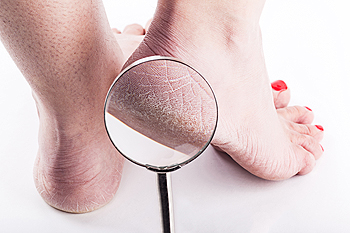Let’s Talk Heel Fissures

Skin fissures are cracks in the skin that are caused by dry and thickened skin. These can also come from underlying conditions and lifestyle factors. A common place to get such fissures is on the heels of the feet. The skin needs nutrients and food, such as proteins, vitamins, and fatty acids to remain healthy and maintain moisture. Skin conditions that result in inflammation, itching, and dryness, like eczema and psoriasis can lead to heel fissures. A fungal infection, like athlete’s foot, can have the same result. Those with diabetes frequently have neuropathy which inhibits sweating, thus causing dryness and can cause fissures. Some lifestyle factors that can contribute to heel fissures include wearing open-backed shoes, using harsh soaps on the feet, and not drinking enough water. The fissures can be shallow or deep, bleed, and be painful. Irritants and bacteria can enter the cuts in the skin and become infected. If not treated, fissures can turn into ulcers. It is important to check the feet regularly and keep them clean, dry, and moisturized. Wearing insoles or heel pads in shoes can help with the discomfort of this condition. If you have heel fissures, it is highly suggested that you visit a chiropodist for treatment.
Dry, cracked heels are more than a cosmetic inconvenience. For many people, they are uncomfortable, deep, painful, and may even bleed. If you suffer from cracked heels, please consult with one of the specialists from Thornhill Foot Clinic. Our chiropodists can help you maintain the health of your lower limbs and your mobility.
Causes
Prolonged standing
Wearing open-back shoes
Wearing shoes that don’t cushion the heels
Living in a cold or dry climate
Taking long, hot showers
Not moisturizing the heels
Eczema
Psoriasis
Palmoplantar keratoderma
Juvenile plantar dermatosis
Treatments
Soaking the feet
Exfoliating with a pumice stone
Moisturizing the heels
Wearing closed-back shoes that cushion heels
Avoiding prolonged standing
Taking warm, rather than hot, showers
Treating underlying skin conditions
While milder cases of cracked heels can be treated at home, some patients present with deep, painful, bleeding heel fissures that are at risk of becoming infected and may require medical care. Additionally, patients with diabetes or any other conditions that affect the immune system should be monitored by a chiropodist.
If you have any questions, please feel free to contact our office located in . We offer the newest diagnostic and treatment technologies for all your foot care needs.
